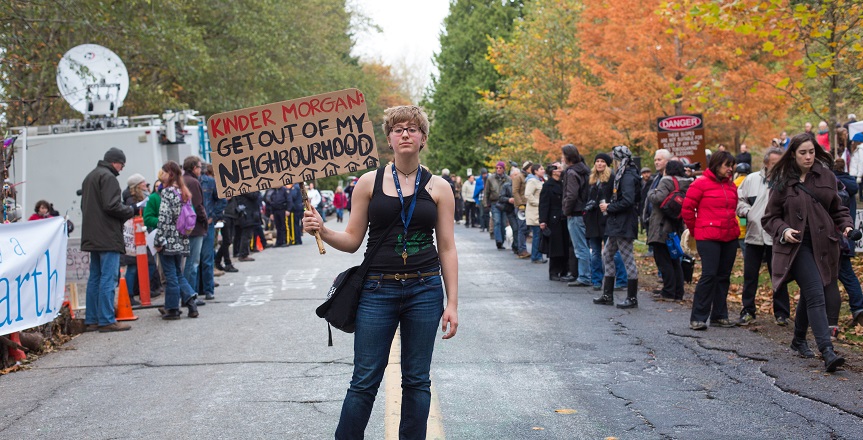Evans Yellow Old Woman, a two-spirit member of the Siksika Nation, gave the land acknowledgement at Calgary Pride last weekend. Immediately after the acknowledgement, Alberta Premier Rachel Notley took to the stage to declare that her government would press forward with the Trans Mountain pipeline expansion, despite the recent court decision overruling the government’s approval of the project.
Land or territorial acknowledgements are typically used as inaugural addresses to recognize and signal respect for Indigenous communities’ historical and continued existence and claim to the land. At their best, land acknowledgements serve as disruptive, reflexive, and validating calls to action. At their worst, they are no more than tokenistic gestures disguised as reconciliation.
But as land acknowledgements are institutionalized and codified in both progressive and more mainstream spaces, many Indigenous activists are left questioning such acknowledgements’ ability to engender meaningful action towards reconciliation. Because certainly, a land acknowledgement is the condition for, not evidence of, such action.
In a powerful open letter to Premier Notley, Evans Yellow Old Woman reminds us of this, further writing that, “we do not own the land, we belong to the land.” And as Brent Patterson writes this week, reconciliation first requires a deep reckoning with and rejection of Canada’s genocide against Indigenous communities. In present terms, this means taking seriously the principles of free, prior, and informed consent, and committing to policies and legal frameworks that protect Indigenous land rights. With those structures in mind, it becomes nearly impossible to envision a scenario in which the Trans Mountain pipeline could exist.
Of course, Rachel Notley isn’t alone in her belief that reconciliation and environmental destruction are compatible. Brent Patterson reports how, immediately following the court’s overturn of the government’s approval of the Trans Mountain pipeline expansion project, the Trudeau government vowed to press forward anyway.
Parliamentary reporter Karl Nerenberg unravels the political impact of the court’s decision, which rejected the project’s approval on two grounds: that the review process failed to consider the environmental impact of oil tankers off the B.C. coast and that the government failed to engage in meaningful dialogue with Indigenous stakeholders during the final consultation process.
And finally, read David Suzuki on why the court decision is just one step in the right direction. Canada — we have a lot of work to do.
In other rabble news
Union membership may be shrinking, but the number of workers who wish they had union representation is very much on the rise. The reasons underlying this surge in labour consciousness aren’t all that hard to guess. For some belated Labour Day reading, check out David Climenhaga on the growing interest in unions across North America; read Rohan Ghatage‘s review of Annie Lowrey’s book, Give People Money, a persuasive case for universal basic income, in our books section; and read Ed Finn on why unemployment statistics don’t tell the whole story when it comes to inequality.
Ever since Trump signalled he was in search of an even more lopsided trade agreement, NAFTA negotiations have proved an endless source of diplomatic drama and political posturing that obfuscates crucial policy considerations around climate change and corporate power. And while mainstream media has eaten up the saga as a tale of Trump vs. Trudeau, chalking up points along the way, the real losers in any such free trade agreement are, of course, the people. Read Brent Patterson‘s probe on why Trudeau is adamant that Canadians are committed to NAFTA’s Chapter 19, a dispute resolution mechanism. And read Duncan Cameron on the negotiation’s stakes for the Liberals.
Sophia Reuss is rabble.ca’s Assistant Editor.
Image: Mark Klotz/Flickr
Help make rabble sustainable. Please consider supporting our work with a monthly donation. Support rabble.ca today for as little as $1 per month!




